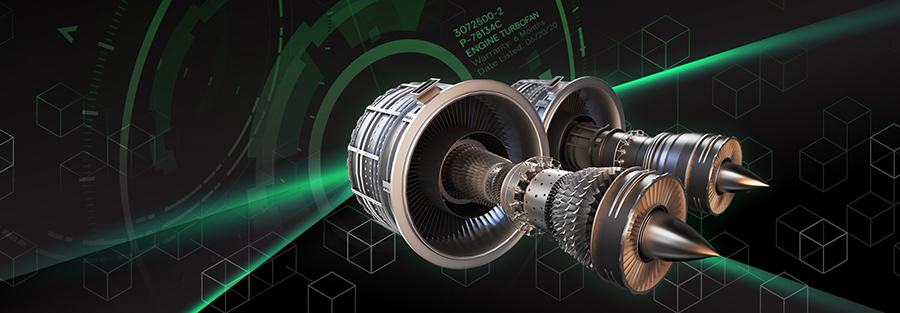Honeywell’s GoDirect™ Trade Leverages Blockchain to Overhaul Aircraft Parts Aftermarket
Lisa Butters’ kids that two years ago she could barely spell blockchain; today she is general manager of the aerospace sector’s first blockchain-based e-commerce marketplace for used serviceable and new surplus parts inventory – GoDirect™ Trade.
Butters’ journey from blockchain novice to resident expert began when she was tapped by Honeywell Aerospace leadership to “crack the e-commerce nut” in the parts aftermarket, which was pegged at $4.9B in 2018, according to The Insight Partners. Despite the many entities that have launched online storefronts seeking to shift the industry into the digital age, less than three percent of all sales globally are transacted online annually, Butters noted.
So, Butters and her team conducted an exhaustive research effort to understand the factors that were hampering widespread adoption of existing e-marketplaces – including market dynamics, technology access and compatibility and behavioral and social drivers. The critical missing link in these digital shops, they determined, was trust.
“We had this customer problem that was grounded in a need for trust and a technology that was built to solve the trust issue. It was a natural fit for us.”
Of course, trust in commerce can take many forms: “I trust the part is what you say it is,” “I trust that this is a fair price,” “I trust that you will deliver as promised.” While these are all important manifestations of trust, in aerospace, nothing is more crucial, than “I trust that this part is safe.”
“Safety is the number one priority of airlines,” said Butters. Unfortunately, it’s not always the top priority of all those involved in the aviation aftermarket. And, when a quality lapse occurs, whether due to carelessness or illicit dealings, the consequences can be tragic. For example, a 2016 California-based news organization reported that according to NTSB data, between 2011 and 2016, unapproved parts were suspected to have “played a role” in nearly two dozen aviation accidents that resulted in seven fatalities and 18 serious injuries.
As rare as these incidences may be, it’s a risk reputable buyers and sellers are, understandably and thankfully, unwilling to take. “In our industry, ‘trust’ has traditionally been derived from an established business relationship between the buyer and seller,” said Butters. “So, most often people only buy to or sell from people they already know and all of those transactions are done through emails and phone calls.” She explained that it takes an average of four emails and two phone calls just to close on one of these purchases.
The challenge for Butters and her team was to figure out how to build an online process that could leverage the time and cost-efficiencies of digital commerce, while giving buyers the kind of assurance they got from long-standing “real-world” relationships. Enter distributed ledger technology, aka blockchain.
“Few of us has any real experience with blockchain, but we knew that it was a technology people were using to manufacture trust between trading partners in a digital environment,” Butters said. “So, we had this customer problem that was grounded in a need for trust and a technology (blockchain) that was built to solve the trust issue. It was a natural fit for us.”
GoDirect Trade Stats
The GoDirect Trade blockchain is built on an enterprise-grade, multi-channel Hyperledger Fabric version 1.4, with a proprietary middleware layer developed by Honeywell, and is deployed on Honeywell’s enterprise cloud as well as other commercial clouds. To promote adoption, the applications are built to be able to work across multiple blockchain platforms including Ethereum and R3’s Corda.
All listings on the marketplace are required to have an image of the part, price, full details on its condition (new, used, overhauled, repaired) and FAA 8130-3 airworthiness tag, which confirms any work done on the part has been by an approved maintenance facility. The available pedigree information for every part listed in the marketplace – from nuts and bolts to multi-million dollar engines – is permanently and immutably, written to the GoDirect Trade blockchain.
In addition, every “part event,” including when parts are repaired or dismantled from an aircraft, every time a part is listed on the marketplace and every bill of sale transaction is recorded on the ledger. The ledger is also fully integrated with the SAP ERP system running in Honeywell’s 100 OEM and repair shops around the world so every time it repairs a part, every time it generates airworthiness tags, all of that information gets written on chain. Marketplace users outside of Honeywell, including repair shops, dismantlers and other OEMs, can write to the GoDirect Trade blockchain by logging into a user interface and/or via APIs that connect automatically into their systems to share relevant part data.
“Blockchain allows us to crowdsource a decentralized database of part information in a highly secure way, and make it readily accessible to consumers so they can make quicker, more efficient decisions on their purchasing,” said Butters.
Currently, the marketplace has approximately 6,300 registered users representing 2,400 companies, and 65 seller storefronts including Honeywell Aerospace Trading, Dassault Falcon Spares, BendixKing and Boeing, which recently launched a huge new storefront with $1 billion worth of excess airplane parts. In its first year, GoDirect Trade facilitated $7M in sales, according to Butters. She reported that the marketplace is on track to hit between $20-25M in sales this year, and longer term goals are $100M in 2021 and $250M by 2022.
It’s a promising start, but Butters knows there is still a long road ahead. “The aerospace industry is so complicated and heavily regulated, change is slow. And lot of the companies we are dealing with are large and are not used to sharing data. There is this walled garden approach to how data is stored and managed,” she explained. In addition, the aerospace industry’s documentation and record keeping processes can be best described as antiquated – largely paper based, with little consistency to how the various players, including airlines, dismantlers, repair shops and overhaul facilities, store and share their data.
“We have to focus on the things that blockchain is good at: it’s secure, it’s immutable, it’s crowdsourced and it can interpret and execute rules using programming logic.”
Butters estimates that it could take 5-10 years for mass adoption of blockchain in the sector. “So many people still do not understand blockchain and the value it can bring. Some think it is just a cryptocurrency technology, others think of it as a silver bullet to solve all counterfeit problems,” she explained. “What I tell them is that blockchain is not a silver bullet for anything, but for many industries – aerospace included – it has the potential to be a game changer. We have to focus on the things that blockchain is good at: it’s secure, it’s immutable, it’s crowdsourced and it can interpret and execute rules using programming logic.”
In addition to implementing blockchain in the GoDirect Trade marketplace, Honeywell is also working to establish a new standard for how part provenance is managed in aerospace using blockchain. The company is developing a process that utilizes patented technology from iTRACE Technologies, SecureMarking Inc. and Honeywell Performance Materials and Technology to “mark” parts as they come off the Honeywell assembly line and then activate the “authenticity and birth records” with two-factor authentication marking that is written to its blockchain ledger. This Trust Trace™ system could transform the entire aftermarket landscape where used parts can change ownership an average of four times, according to Butters.
“Imagine a world where a repair technician can scan a code and shine a pen light on the identification plate to verify it is a legitimate part. Every stop that part makes on its journey is tracked on the blockchain. Having this data can provide unprecedented levels of transparency,” she concluded. “Not only have we connected the dots to link physical parts to the digital domain, but Trust Trace has really put the icing on top of the cake by layering anti-counterfeit technology with blockchain.”
Related Resources
Blockchain Demo: Accenture Blockchain-Based Configuration Management Simulation
AIA Report: Blockchain in Aerospace & Defense
PwC Article: How Blockchain Can Improve the Aviation Industry
Case Study: Honeywell Aerospace creates parts marketplace with Hyperledger Fabric
Panel Discussion: Hyperledger Global Forum – Blockchain in Action
Article: Blockchain Smart Contracts: Mutually Reinforcing Power

